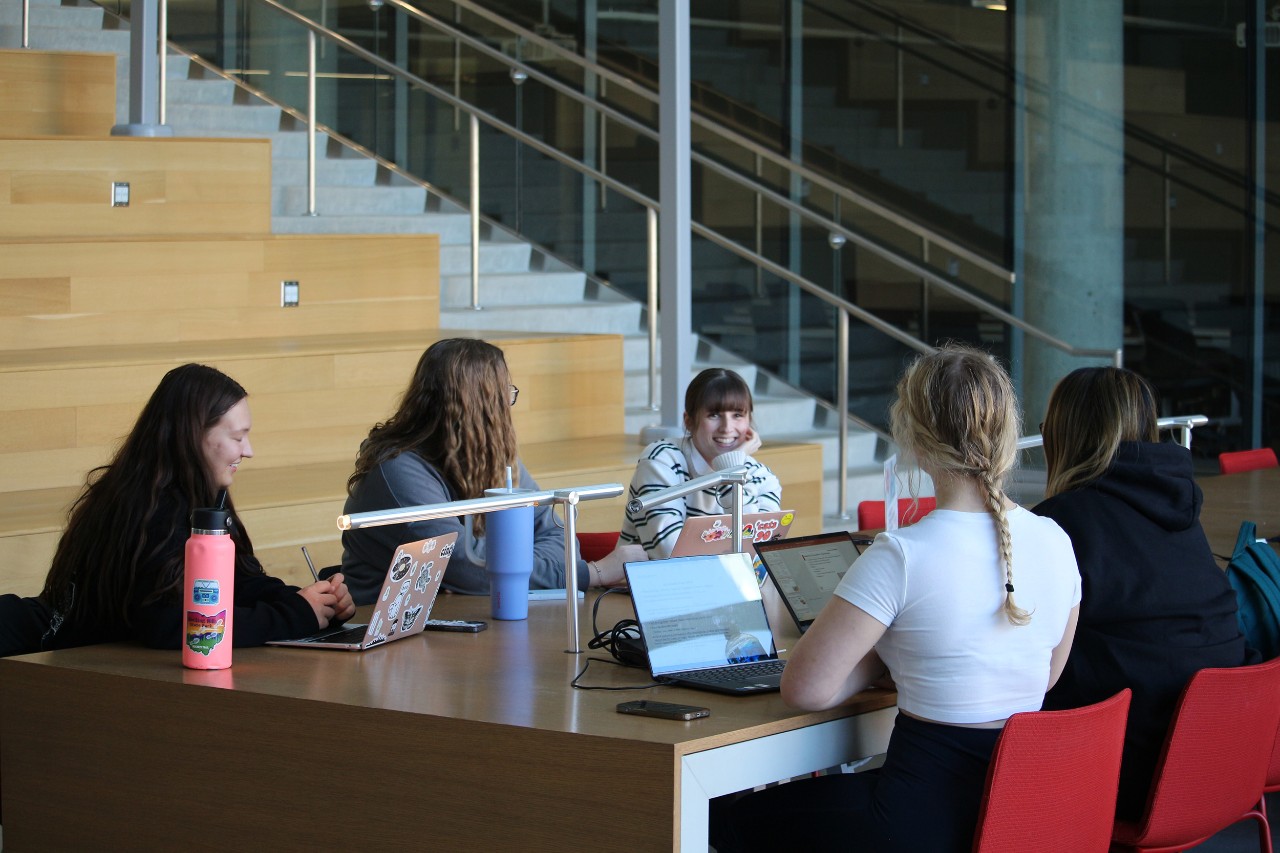
Five tips for success in group work
CAHS graduate student Kaitlyn Knific shares tips for completing group work in college
Navigating group work may seem far from the independence and autonomy typically associated with college. Nonetheless, it helps provide students with exposure to real-world practices.
In most health care professions, interprofessional practice is a term used often. Interprofessional collaboration occurs when two or more professions collaborate to provide adequate care and informed intervention. As such, learning to collaborate and work as a team is crucial for academic success and professional competency.
These five tips will help you better navigate group projects and provide you with the necessary skills for your future career!

Kaitlyn Knific
Understanding and valuing differences
When you arrive at college, you may be surprised that your values and practices may be different from others. It is essential to remember that everyone has a distinct cultural background and upbringing. Therefore, you cannot expect that your way of doing things is a given. If you jump into group work with assumptions and judgments of others’ behaviors, you risk a communication breakdown and stifling the creative benefits of diversity.
The key to unraveling and making the most of differences is a willingness to meet others at their level. This means you must be willing to examine your beliefs and consider where they may come from and how you might apply them to others. Understanding that other perspectives are just as valuable as your own and committing yourself to the idea that you always have something you can learn will empower you and your group members to build upon and work with each other’s ideas and communication styles.
Identifying your strengths and weaknesses
In collaborative work, we often need to recognize our role within a group. Establishing what each group member has to offer is essential to completing projects efficiently. This may take a fair amount of introspection and a run-down of how you have fared in group projects in the past. Ask yourself, where have you seen success, and when have you encountered challenges?
This can go beyond just an academic setting; think of hobbies, work, and other activities that have required you to apply yourself. Do you find that you are good at managing and leading group projects? You may be more effective at building and encouraging the ideas of others. It may be that you are not a natural spokesperson and rely on others to present group ideas. Once you have established where your skills are best used, you should communicate this to your team members.
Setting clear expectations and deadlines
The biggest threat to a group project is when clear expectations are not established among the group members. Often, this may look like one team member taking on more work than others. This can create frustration and may hurt the quality of the final product. Starting a conversation on group roles, responsibilities, goals, and deadlines is essential.
Though clarifying these elements is critical, you may need help to breach these topics. One way to responsibly manage this is to speak in plain words that uplift and inquire rather than demand. For example, asking instead of telling people what is expected of them may be helpful when assigning roles. This can look like asking your group members where they think their skills are best used and how they might succeed in meeting deadlines. Ensuring that expectations are attainable for everyone will mutually benefit all involved and enable you to hold each other accountable.
Keeping the lines of communication open
Communication is vital when fostering trust, motivation and direction within a team. This is why providing feedback and being able to handle input determines the success of a project. To keep the lines of communication open, your feedback must follow three rules- timely, detailed, and useful.
When giving others input on their project portion or ideas, get back to them as soon as possible. If you are not providing direct feedback when issues arise, then resentment may build among group members. Additionally, if you wait until the last second to mention a problem, you and your team members may need more time to correct the mistake.
Also, ensuring your feedback is specific and detailed will be more beneficial to your team members than vague and directionless input. You must also ask for the details when you get feedback.
Finally, make sure what you say is helpful to your group members and the project's success. Ask yourself if the person you are talking to can benefit from what you are saying and whether it is appropriate and relevant to the task. Seek confirmation that they understand what you are saying. Affirm to others that their insight is also recognized and appreciated.
Sticking to the plan
All the elements listed so far are the components that will enable you to stay on track when completing a project. However, if you need help to follow through on your end of the project, there are ways for you to hold yourself accountable.
Writing down a plan of action may help you stay on track. This can be as simple as writing down a list of goals and the order in which you will complete them. Working towards a goal can be challenging, which is why it is also essential to find small ways to reward yourself and your teammates. Big or small, these bonuses or words of encouragement will help you and your partners stay motivated.
Being a group member means you will also have others hold you accountable. Remember that your group members have the same goals as you and that your success is critical to the group's success. Your partners are there to help, remind you of deadlines, and provide encouragement when setbacks arise. Receiving support and the motivation to take risks allows you to explore complex tasks that you otherwise may not have been able to do alone. This is why group projects should be an opportunity to enhance learning rather than an obstacle to overcome.
Next Lives Here
We're training the next generation of health care team professionals. Interprofessional education can be found in our undergraduate and graduate programs in the College of Allied Health Sciences.
By: Kaitlyn Knific
Speech-Language Pathology graduate student, College of Allied Health Sciences
Related Stories
Flexible program options allow social work students to study at their own pace
April 16, 2021
The University of Cincinnati Accerated Master of Social Work (MSW) program gives students the opportunity to save time and money while obtaining their degree for an in-demand career field.
Village Life partners with UC International to support Global Scholars
April 14, 2021
Two students from Tanzania receive Global Opportunity Scholarships and get a big Bearcat welcome!
First cohort accepted for Accelerated Dietitian Nutritionist pilot program
April 21, 2021
The University of Cincinnati Accelerated Dietitian Nutritionist Program gives students fast-track path to becomming an RDN while giving them exceptional internship experiences.